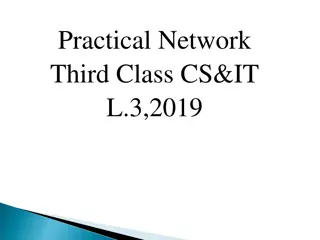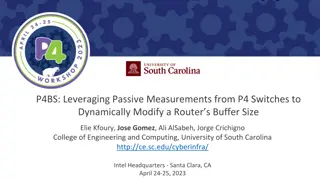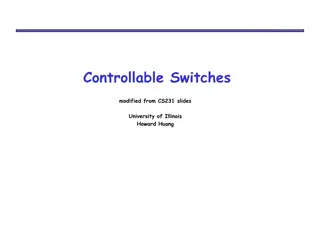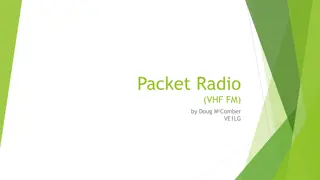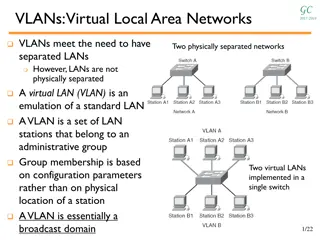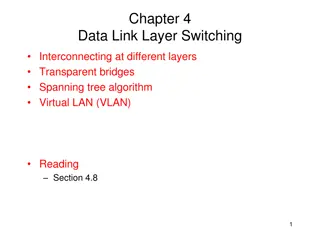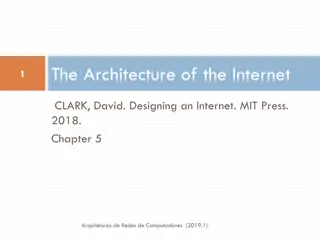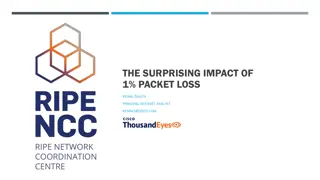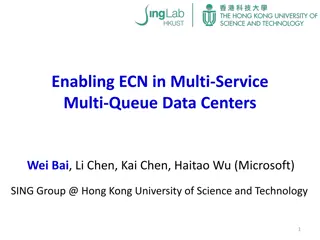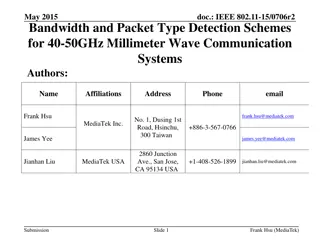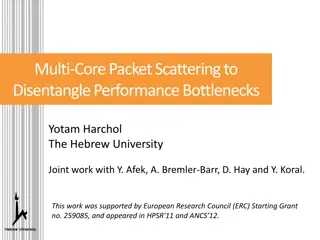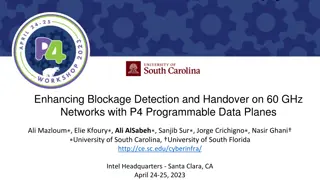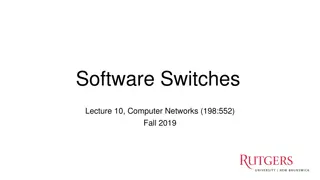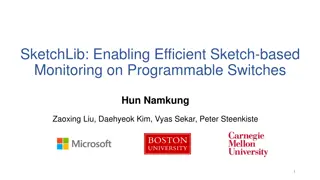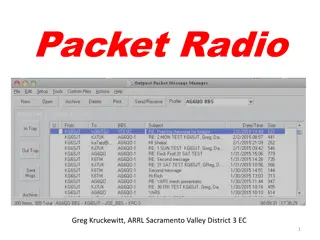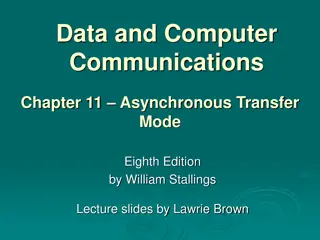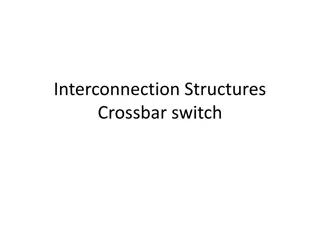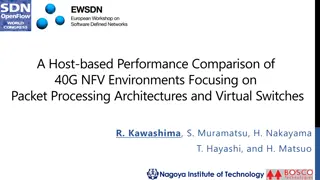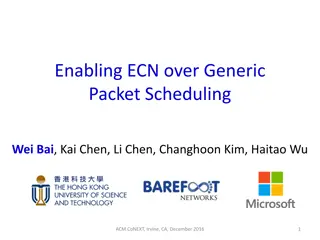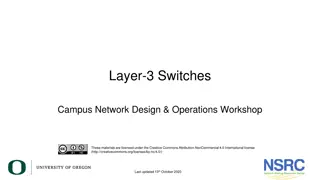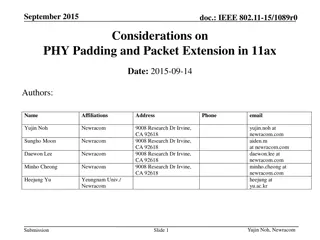North America Outdoor Disconnect Switches Market
The North America Outdoor Disconnect Switches Market size is expected to reach USD 2,107.81 Million by 2033, at a CAGR of 5.3% during the forecast period 2023 to 2033. \n\n
1 views • 4 slides
Hands-On Training with P4 and Hardware Switches at University of South Carolina
The University of South Carolina offers hands-on training using hardware switches in a cloud system. The system provides remote-access capability to lab equipment for virtual labs on P4, routing, high-speed networks, and cybersecurity. Open-source libraries consist of various activities and experime
0 views • 11 slides
Revisiting LDPC Rate Matching in IEEE 802.11 for Improved Performance
The document discusses revisiting LDPC rate matching in IEEE 802.11, focusing on issues such as performance loss compared to previous standards, power consumption in LDPC decoding/encoding, and over puncturing. It covers preliminary concepts, packet size distribution in various devices like laptops
2 views • 17 slides
Virtual Labs on SDN and P4 Programmable Switches
Explore the motivation behind Software-Defined Networking (SDN) and P4 programmable switches, highlighting the shift from traditional networking to more flexible and innovative approaches. Understand how SDN challenges protocol ossification, separates control and data planes, and enables packet-forw
2 views • 47 slides
Introduction to Networking Devices: Hubs, Switches, and Routers
Explore the essential networking devices - hubs, switches, and routers - that facilitate connections between computers and networks. Learn about the functions, differences, and applications of these devices in managing data flow and enhancing network efficiency. Dive into the basics of network conne
0 views • 28 slides
Double Pole Double Throw Micro Switches Market Industry Analysis and Forecast 2032
The global double pole double throw micro switches market size was USD XX Billion in 2023 and is projected to reach USD XX Billion by 2032, expanding at a CAGR of XX % during 2024\u20132032
0 views • 6 slides
Dynamic Buffer Sizing using Passive Measurements from P4 Switches
This study explores the dynamic modification of router buffer sizes by leveraging passive measurements from P4 switches. By dynamically adjusting buffer sizes based on factors like the number of long flows, average round-trip time, queueing delays, and packet loss rates, network performance can be o
3 views • 14 slides
Understanding Controllable Switches and Basic Logic Gates
Explore the concept of controllable switches and basic logic gates in the context of building machines that can perform complex tasks swiftly, such as weather forecasting, medicinal drug design, speech recognition, robotics, and artificial intelligence. Learn how controllable switches can be leverag
0 views • 17 slides
Workshop on Fine-grained Measurements App with P4 Programmable Switches
Explore the world of P4 programmable switches in a workshop hosted by the University of South Carolina. Learn about P4, programmable data plane switches, packet parsing, queue monitoring, and applications with P4 switches. Discover the shift from traditional networking to SDN, overcoming limitations
1 views • 19 slides
Basic Switch Configuration Guide for Setting Up VLANs
Configuring switches from basic settings to creating 3 VLANs using subnet 192.168.100.0/24. Follow the commands provided for setting up VLANs, trunk links, and default gateways on switches for efficient network communication.
0 views • 10 slides
Understanding Packet Radio: A Comprehensive Guide
Packet radio, utilizing VHF FM technology, is a digital mode allowing keyboard-to-keyboard communication, messaging, mailboxes, bulletins, and more. It uses the AX.25 protocol and operates at varying data rates on VHF and HF bands. The system comprises basic stations and automated nodes, each requir
0 views • 20 slides
Understanding WAN Technologies and Routing in Large Networks
WAN technologies enable communication over large geographic distances, connecting multiple sites efficiently. Packet switches play a crucial role in forwarding packets, with modern WAN architecture focusing on interconnecting switches using LAN technology and leased digital circuits. Store and forwa
1 views • 17 slides
Understanding Three-Way and Four-Way Switches in Electrical Systems
Explore the intricacies of Three-Way and Four-Way switches with detailed diagrams and explanations. Learn about wiring configurations, power flow, and essential rules for installation. Gain insights into switch types, common terminals, and conductor connections for effective electrical control setup
0 views • 14 slides
Understanding Controls in Ergonomics
Controls in ergonomics are devices enabling communication and manipulation of objects, enhancing power, reach, and reducing effort and risk. They transmit information discretely or continuously through hand push buttons, foot push buttons, toggle switches, rotary selector switches, knobs, cranks, wh
0 views • 13 slides
Evolution of Programmable Switches and Routers
Explore the evolution of programmable switches and routers, from early attempts at programmability to the introduction of the P4 programming language and Software Defined Networking (SDN). Discover the shift towards greater customization and control in network infrastructure, leading to the developm
0 views • 40 slides
Understanding VLANs in Computer Networking
VLANs (Virtual Local Area Networks) allow for the logical separation of LANs without physical segregation. They group network stations based on administrative criteria rather than physical location. VLANs enhance security, facilitate group collaboration, and optimize network traffic by segregating d
0 views • 22 slides
Understanding LAN Interconnection and Switching Technologies
This content delves into the concepts of interconnecting LANs, exploring the reasons and methods behind partitioning LANs and interconnecting them at different layers using repeaters, hubs, bridges, switches, and routers. It also highlights the differences between these devices in terms of their net
0 views • 21 slides
Understanding Internet Architecture and Networking Principles
The content explores the architecture and goals of the Internet, focusing on its original objectives, survivability in the face of failure, and evolving requirements. It delves into how networks function, describing behaviors and packet handling. Additionally, it discusses the framework for describi
0 views • 15 slides
Understanding the Impact of 1% Packet Loss on TCP and the Cubic Congestion Avoidance Algorithm
Delve into the surprising effects of even 1% packet loss on network flows, the methods TCP uses to mitigate loss, and how the CUBIC congestion avoidance algorithm works. Explore the researched but not quantified problem of packet loss and learn about a test methodology using Ubuntu hosts to measure
0 views • 24 slides
FY25 Title III Consortium Packet Overview
FY25 Title III Consortium Packet provides information on English Language Proficiency allocations, consortium formation, grant management, board approval requirements, and responsibilities of the lead fiscal agent. English Learner counts determine funding eligibility, with consortiums formed to reac
0 views • 15 slides
Federal Law Change Effective April 1, 2021: Recreational Boat Engine Cutoff Switch Requirements
Starting from April 1, 2021, new federal laws mandate the installation and use of engine cut-off switches on recreational vessels to enhance safety and prevent propeller injuries. The laws apply to manufacturers, distributors, dealers, and recreational vessel operators. Non-compliance can result in
0 views • 8 slides
Enhancing Data Center Performance with ECN-Based Transports
This study focuses on enabling Explicit Congestion Notification (ECN) in multi-service, multi-queue data centers to cater to diverse network requirements. ECN-based transports like DCTCP and DCQCN achieve high throughput and low latency by allowing end-hosts to react to ECN signals and switches to p
0 views • 65 slides
Bandwidth and Packet Type Detection Schemes for 40-50GHz Millimeter Wave Communication Systems
The document discusses bandwidth and packet type detection schemes for 40-50GHz millimeter wave communication systems in IEEE 802.11aj specifications. It proposes a preamble design for auto-detection of bandwidth and packet type to improve channel estimation and decoding efficiency. By utilizing dif
0 views • 27 slides
Enhancing Network Security Through Multi-Core Packet Scattering and Deep Packet Inspection
Explore the use of multi-core systems to tackle performance bottlenecks in network intrusion detection systems, specifically focusing on deep packet inspection. Techniques such as load balancing and pattern subset scanning are discussed to optimize DPI processes and improve overall network security
0 views • 43 slides
Data Plane Heavy Hitter Detection and Switches: A Comprehensive Overview
In this comprehensive guide, explore the concepts of heavy-hitter detection entirely in the data plane, the significance of detecting heavy hitters, emerging programmable switches, existing techniques, and constraints faced in processing heavy flows. Discover the motivation behind the Space-Saving A
0 views • 33 slides
Exploring the Evolution of Data Communications: A Brief Overview
Delve into the progression of data communications from Morse code to modern radio email systems like Winlink. Discover the history of protocols, technologies, and the impact of the internet on amateur packet radio. Unravel the development of ARQ data protocols, X.25 packet switching, and the transit
0 views • 51 slides
Enhancing Blockage Detection and Handover on 60 GHz Networks with P4 Programmable Data Planes
The study presents a system using programmable switches to monitor packet inter-arrival time for blockage detection on mmWave networks. Results show fast recovery speeds and minimal impact on flow completion time, with contributions focusing on leveraging programmable switches and real device scenar
0 views • 7 slides
Understanding Software Switches in Computer Networks
Delve into the world of software switches, exploring their evolution from early roots in networking to their role in enabling flexible policies and virtualization. Discover the importance of implementing policies in virtualized switches and the requirements of OpenVSwitch, shedding light on its desi
0 views • 24 slides
Effective DGA Family Classification using Hybrid Inspection Technique on P4 Switches
Attackers utilize Domain Generation Algorithms (DGAs) as dynamic communication methods in malware like botnets and ransomware to evade firewall controls. This study presents a novel approach that combines shallow and deep packet inspection on P4 Programmable Switches for efficient classification of
0 views • 19 slides
Enhancing Efficiency in Sketch-based Monitoring for Programmable Switches
SketchLib introduces advancements in sketching algorithms to enable efficient monitoring on programmable switches. The tool bridges gaps between existing sketches for CPUs and programmable switches, offering resource optimizations and API calls to enhance performance and reduce resource consumption
0 views • 20 slides
Understanding the Basics of Packet Radio for Amateur Communication
Explore the world of packet radio, a digital mode used by amateur radio operators to build wireless computer networks. Learn about its benefits, how it works using the AX.25 protocol, making connections, advantages such as error checking, and building a packet station with the necessary components.
0 views • 19 slides
Understanding Asynchronous Transfer Mode (ATM) in Data and Computer Communications
Asynchronous Transfer Mode (ATM) is a packet transfer technology that supports multiple logical connections over a single physical interface. It uses fixed-sized packets called cells for data transfer. ATM bears similarities to packet switching and offers streamlined packet transfer with minimal err
0 views • 46 slides
Understanding Crossbar Switch Interconnection Structures
Interconnection structures like crossbar switches consist of crosspoints that control the pathways between processors and memory modules. The switch determines the transfer path and resolves access requests on a priority basis. Through multiplexers and arbitration logic, crossbar switches enable sim
0 views • 6 slides
Performance Comparison of 40G NFV Environments
This study compares the performance of 40G NFV environments focusing on packet processing architectures and virtual switches. It explores host architectures, NFV related work, evaluation of combinations of PM and VM architectures with different vswitches, and the impact of packet processing architec
0 views • 24 slides
Enhancing Data Center Network Performance through Packet Scheduling and ECN
Explore the advancements in data center network performance improvement through techniques like packet scheduling, Explicit Congestion Notification (ECN), and strict priority for different types of flows. The research discusses the requirements of low latency for short messages and high throughput f
0 views • 48 slides
Understanding Wireshark Filters for Efficient Packet Analysis
Learn how to leverage Wireshark capture filters to customize packet analysis, enhance traffic visibility, and optimize network monitoring. Capture only the data you need, create custom filters, and streamline intrusion detection analysis with Berkeley Packet Filters (BPF). Discover the power of disp
0 views • 17 slides
Understanding Layer 3 Switches: Functionality and Configuration
Layer 3 switches combine the features of Ethernet switches and routers, allowing them to process both MAC and IP headers. By configuring VLANs, trunking, and management interfaces, these switches can handle data forwarding across different subnets efficiently. This guide explains the basic principle
0 views • 19 slides
Considerations on PHY Padding and Packet Extension in 11ax
The document discusses the proposed PHY padding and packet extension for IEEE 802.11ax, focusing on considerations for processing data within SIFS duration and relaxation of LDPC decoding processing time. It outlines the overview of the proposed padding scheme, considerations for LDPC implementation
0 views • 15 slides
Innovative Application Packet for ACE Solutions - Explore the Visual Journey
Dive into the visually captivating world of ACE Solutions with their cutting-edge application packet. From stunning visuals to advanced functionality, this packet showcases the power and versatility of ACE Solutions for modern applications. Discover the seamless navigation, engaging content, and ric
0 views • 59 slides
Effective DGA Family Classification Using Hybrid Inspection on P4 Switches
Researchers present a hybrid shallow and deep packet inspection technique on P4 programmable switches for effective classification of Domain Generation Algorithms (DGAs) used by malware. The study focuses on dynamic Command and Control (C2) communication methods, challenges in DGA attacks, existing
0 views • 20 slides




